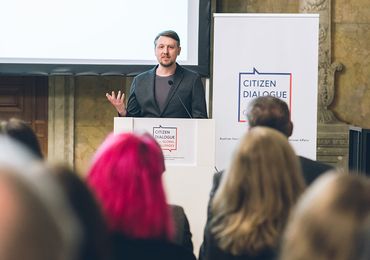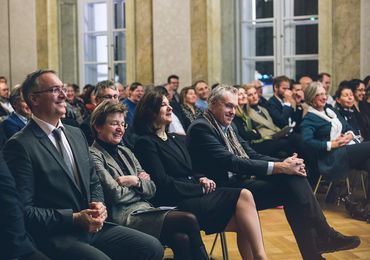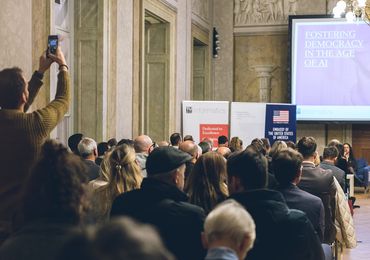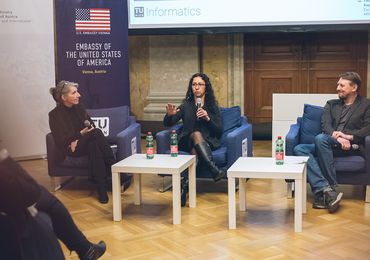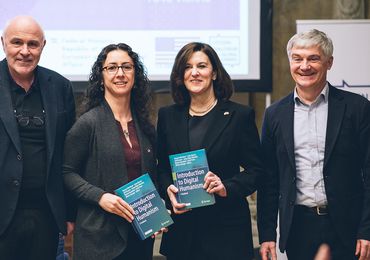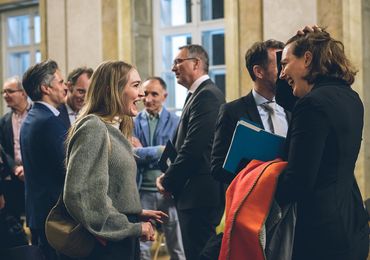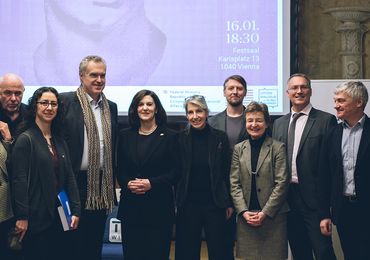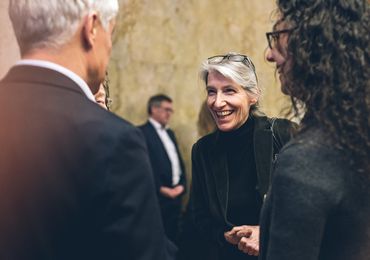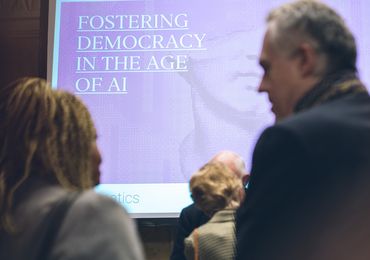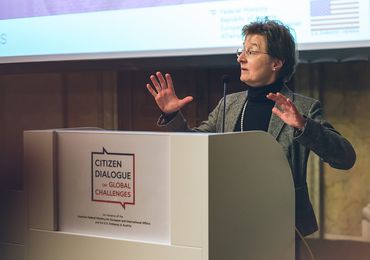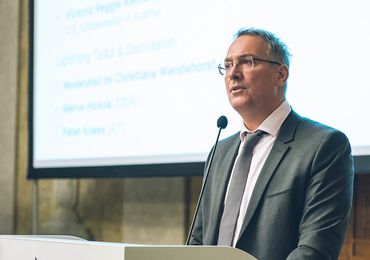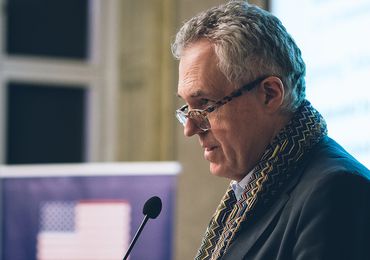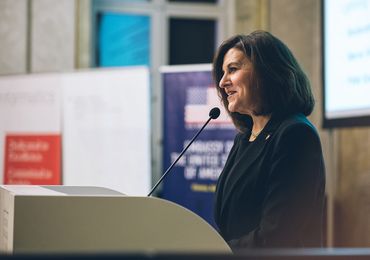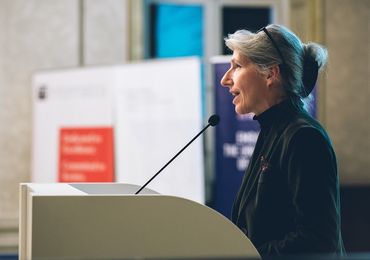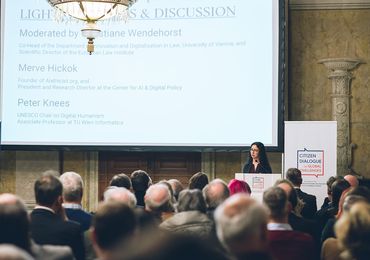U.S.–Austria Citizen Dialogue: AI’s Impact on Democracy
In 2024’s record election year, a global forum at TU Wien examined AI’s critical influence on democracies and ways to navigate its challenges.
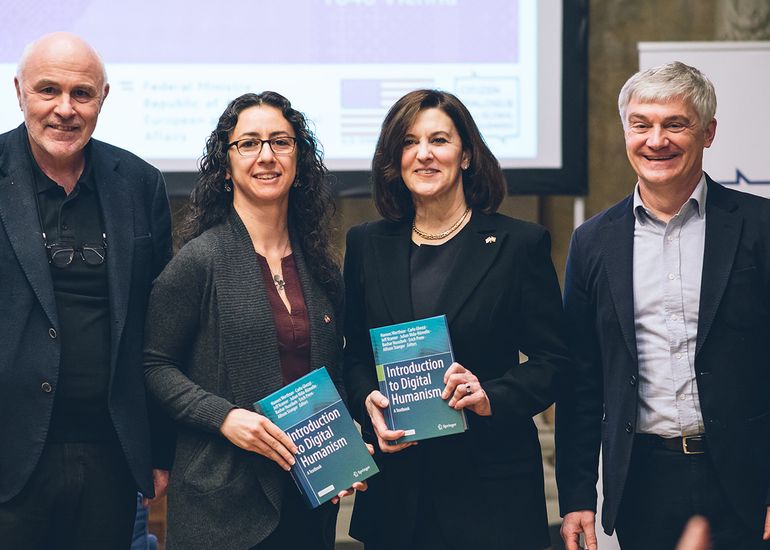
2024 marks the biggest election year in history. With over four billion people being sent to the polls worldwide, the role of Artificial Intelligence (AI) for democracies is more crucial than ever. On January 16, 2024, TU Wien Informatics invited policymakers, scientists, students, and citizens for a discussion on how AI is shaping our democratic nations. “Fostering Democracy in the Age of AI” is the first in a series of conversations of the new U.S.-Austria Citizen Dialogue organized by the Austrian Federal Ministry for European and International Affairs (BMEIA) and the U.S. Embassy in Austria. This bilateral initiative encourages civic engagement and brings Austria and the United States closer together in our shared values.
Peter Ertl, Vice-Rector for Research, Innovation, and International Affairs at TU Wien, and Dean of TU Wien Informatics, Gerti Kappel, highlighted the university’s dedication to democratic values in AI research and development. Christoph Thun-Hohenstein, Ambassador and Director General for International Cultural Affairs at BMEIA, alongside Victoria Reggie Kennedy, U.S. Ambassador in Austria, called attention to the importance of international collaboration in tackling challenges presented by AI. Christiane Wendehorst, Co-Head of the Department of Innovation and Digitalisation in Law at the University of Vienna and Scientific Director of the European Law Institute, moderated the lively discussion.
Uncivil AI
“Fostering democracy in the age of AI is not a preference. It is imperative,” AI ethics and policy expert Merve Hickok opened her talk. AI does not exist in a vacuum: AI systems mirror biases in our societies, inadvertently perpetuating inequalities in race, gender, and ability. Consider this: 16% of the global population experience disabilities. Yet, AI systems often fail to represent or remain inaccessible to these individuals. “Algorithms are only as unbiased or biased as their data. But it doesn’t have to be this way, and it doesn’t have to stay this way,” Hickok is sure.
Generative AI introduces a new dynamic. Systems like ChatGPT lower the threshold of skills and costs we need to use AI – also for malicious intent. From misleading information to outright fraud, the risks are stark. “It seems unavoidable. We see what can be done and how abuse threatens us every day. However, that AI is increasingly uncivil is not a trait of the systems per se, but predominantly lies in their uncivil use,” AI expert Peter Knees points out. The ‘perfect trifactor’ of access to vast personalized data, readily accessible synthetic content, and fast dissemination through social media enables sowing distrust at an alarming rate – especially during elections.
Trust Issues
The erosion of trust is the number one threat to our democracies, Hickok and Knees agree. “The distrust we’re witnessing now in our online world is not reflective or critical, but a destructive force,” Knees states. Democracies must invest in digital literacy so their citizens learn to understand AI’s limits. One further cornerstone is media pluralism and investing in a public service internet. Knees is convinced that we have to start advocating for digital platforms addressing citizens as informed participants, not mere consumers.
Regulation can help clarify AI’s limitations and set safety standards – as is common practice for any other technology. “Democratic nations need to ensure that citizens are not mere experiments in the AI landscape. We should feel comfortable setting red lines, creating oversight and accountability for governments,” Hickok asserts. The CAIDP’s AI and Democratic Values Index is a testament to this effort, analyzing 75 countries against their AI policies and practices. Austria was commended for its citizen engagement in AI strategies, but there is much to be done. Merve Hickok’s call to action is clear: “We all have a voice. We don’t need technical skills to state how AI affects us. With public engagement, we can protect our rights, the rights of our loved ones, and our communities.”
Combatting incivility requires a commitment to reason. This is evident at TU Wien Informatics, where a wealth of projects in AI prioritizes human-centric approaches. The Faculty is at the forefront of the Digital Humanism Initiative, fostering digital technology development and policies based on human rights, democracy, inclusion, and diversity. Concluding the discourse, UNESCO Chair on Digital Humanism, Peter Knees, underscores a rather timeless truth: “Equality, Freedom, and Accountability don’t come for free. Democracy needs resources and it’s worth it. So let’s treat ourselves to more democracy.”
Re-watch
If you watch this video, data may be transmitted to third parties.
Watch on YouTube: https://youtu.be/ii501BYo5xg


